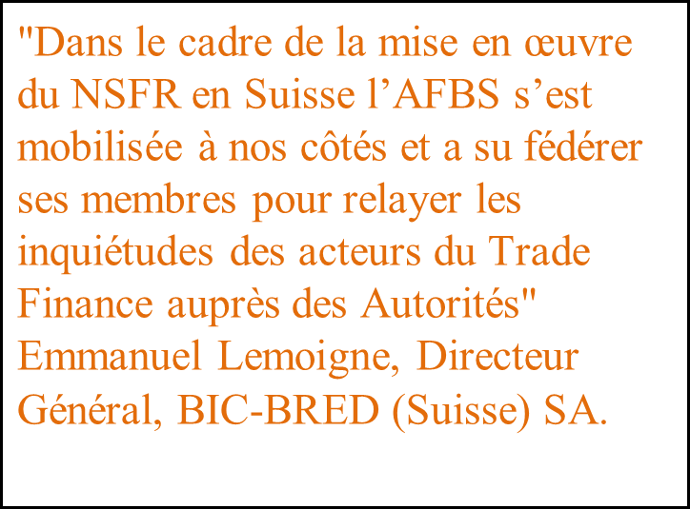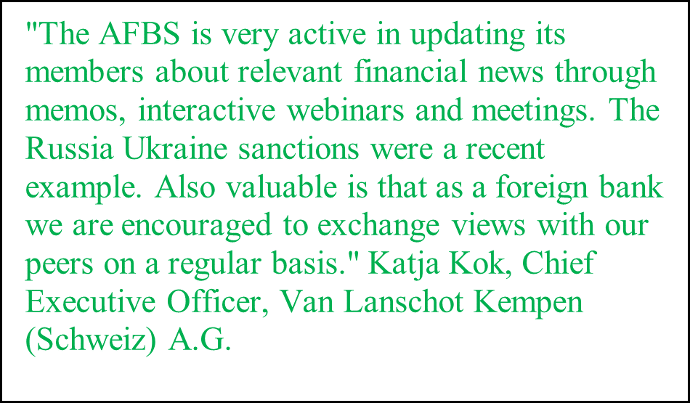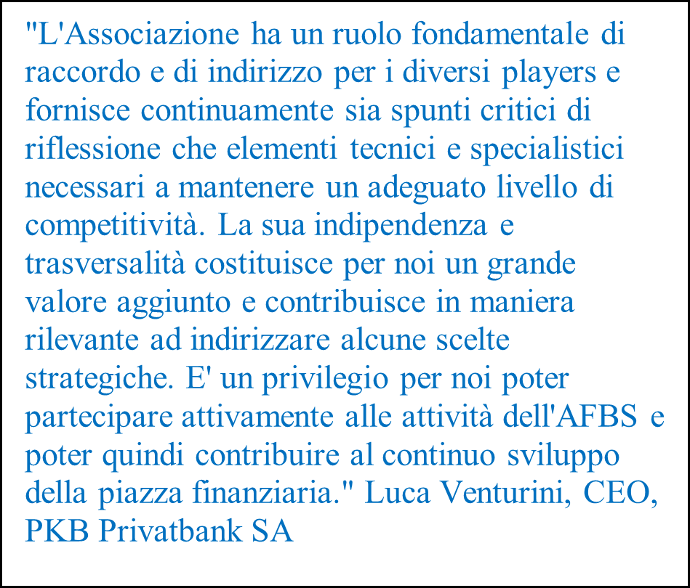Return - or no return - to normality?
A year ago, the global COVID-19 pandemic was the focus of public attention - today relatively few people are talking about it. Public attention, and also the attention of banks, is now centred on the conflict in Ukraine. Whereas a year ago people were getting accustomed to video-conferencing and social distancing, the message today is to pay attention to where money is coming from and where it is flowing to. Public health measures have for the most part been lifted, and the new format of more flexible working from home and at the office is establishing itself. The implementation of sanctions against Russia poses considerable challenges to banks.
In March 2022 the Association organised the first physical meetings. Guests received the invitations with varying degrees of enthusiasm and it seems as if many had learnt to appreciate the flexibility offered by participating via video-conferencing. The video-conferencing format served well for presentations, but for informal exchanges its usefulness has limits. The Association is endeavouring to bring together the advantages of both worlds, and in the future will offer both formats. The Association's Board and Secretariat look forward to continued active participation of members in both the virtual and physical formats.
Sustainable Investments
In the year under review there was no sign of the debate about sustainability in the financial sector easing off; in fact, quite the contrary was the case. The measures to reach the set goals are becoming increasingly tangible. According to the decision of the Federal Council, Switzerland will not enact any state regulation but will leave it to individual economic sectors, for example the Swiss Bankers Association SBA, to pass regulations. Thus, each sector of the Swiss economy should introduce the best suitable measures with the goal of achieving carbon neutrality.
The
situation of the foreign banks in Switzerland is somewhat special in that they
are often already familiar with rules and apply and standards set by their
parent companies. It is therefore possible that in certain areas the foreign
banks in Switzerland are ahead of their Swiss competitors. For this reason also
it is important for the foreign banks that Swiss regulation is concomitant with
international standards and does not independently establish its own
principles. The latter would not only lead to difficulties in implementation but
also give rise to  confusion and uncertainty among
investors. In this regard self-regulation is a wise solution, even if it
entails the problem that it does not enjoy the same recognition as state
regulation.
confusion and uncertainty among
investors. In this regard self-regulation is a wise solution, even if it
entails the problem that it does not enjoy the same recognition as state
regulation.
During the year under review the Association's Board was briefed several times by experts on the ongoing work in this area. The Board recommends that members participate in the various initiatives to increase transparency and promote investor information. Thus, the Association of Swiss Asset and Wealth Management Banks drew up a list of 12 priorities to achieve the goals of the Paris Climate Agreement and formulated procedures to gauge their implementation. Wealth management banks from other banking groups are now invited to join this initiative. The Board has passed this invitation on to members and has also invited them to consider participating in this year's "Building Bridges" event in Geneva.
Digitalisation
The pandemic has given a strong push to digitalisation. Not only has the working environment fundamentally changed, but we can observe innovation also taking place in connection with digital currencies and financial products. The Board heard from representatives of two member institutions about their banks' journeys into the world of digital banking. One expert represented a newly-established digital bank and the other the Swiss subsidiary of an international banking group which has become the group's centre of competence in this area. Switzerland is in a unique position to serve as a centre for digital finance: besides having a state-of-the-art financial centre infrastructure and being globally networked, it also features a flexible regulatory regime aligned with the given situation. The Swiss Financial Market Supervisory Authority (FINMA) has also demonstrated professional competence and shown interest in accompanying new projects.
The subject of digitalisation was high on the list of priorities in the meeting between the Board and the CEO of the SBA as well as in talks with representatives of the Swiss National Bank. The focus of the latter was on the Helvetia and Jura projects and their impact on the commercial banks. Switzerland is far advanced here and in the context of these projects has demonstrated with its western neighbour that it is possible to carry out even crossborder transactions in a digital currency and with digital securities without any problems. In addition, the Board exchanged views with representatives of new, FINMA-licensed crypto-banks and also discussed developments on the international level with senior representatives of members' parent companies.
 The foreign banks are involved in different ways. Some belong to project
groups which are attempting to understand, in both national and international
frameworks, the opportunities and challenges presented by digital currencies.
Others are setting up competence centres in order to adapt their own services
to the new needs and expectations of their clients, both in this country and
internationally. One hears that not all countries' regulatory authorities react
equally openly and competently to enquiries in this area concerning permits and
approvals. It appears that the specialist department established at FINMA a few
years ago has really proven itself.
The foreign banks are involved in different ways. Some belong to project
groups which are attempting to understand, in both national and international
frameworks, the opportunities and challenges presented by digital currencies.
Others are setting up competence centres in order to adapt their own services
to the new needs and expectations of their clients, both in this country and
internationally. One hears that not all countries' regulatory authorities react
equally openly and competently to enquiries in this area concerning permits and
approvals. It appears that the specialist department established at FINMA a few
years ago has really proven itself.
From the beginning foreign market participants have emphasised that Switzerland, with its legislation on Distributed Ledger Technology, has taken an interesting path. We are also seeing confirmation that Switzerland has created attractive framework conditions in which to innovate and develop new products and services, not only in the case of start-ups but also long-established foreign banks. In this area Switzerland is an attractive place to be, a position also confirmed by the fact that not only independent companies are launching their start-up initiatives here, but also that international groups of companies are setting up competence centres in Switzerland.
Another definite contributing factor is the high innovative strength of SIX Group, whose SIX Digital Exchange SDX received its licence from FINMA in the year under review. SDX is the first fully-integrated trading platform that combines old-world expertise on regulatory issues with the new-world offering of digital transaction processing.
Cyber Resilience
The issue of cyber resilience is also part and parcel of digitalisation, and in the previous year was high on the list of the Board's priorities. 5 April 2022 saw the founding of the Swiss Financial Sector Cyber Security Centre (Swiss FS-CSC) in the presence of Federal Councillor Ueli Maurer. With that, the wish expressed by the Association's then President at the 2018 General Assembly is fulfilled: all banks in Switzerland, including the foreign banks, can participate in an exchange of information by joining the Swiss FS-CSC.
The infrastructure is presently under construction. Processes must be defined and procedures clarified. The Association's wish is that the simplest possible information channels are defined. A situation where the same information must be logged and processed by multiple posts is to be avoided.
Ongoing business
 The practice of "remote working" which has been going on for
the past two years has given rise to numerous new risks to the security of
financial institutions. Just the fact that the four-eyes principle now only
functions by telephone or video presents new challenges. Phishing, spam,
man-in-the-middle attacks and fake orders are now much easier to place and
carry out than they were via personal contact, and this situation is once again
a reminder of the importance of having an efficient system of cyber resilience.
The practice of "remote working" which has been going on for
the past two years has given rise to numerous new risks to the security of
financial institutions. Just the fact that the four-eyes principle now only
functions by telephone or video presents new challenges. Phishing, spam,
man-in-the-middle attacks and fake orders are now much easier to place and
carry out than they were via personal contact, and this situation is once again
a reminder of the importance of having an efficient system of cyber resilience.
No sooner had the Swiss financial centre and the world emerged from the COVID-19 pandemic than they had to cope with the next crisis. The conflict between Russia and Ukraine has brought war to the continent of Europe and presents challenges for banks and financial markets. The implementation of sanctions is one specific task. Measures passed in haste give rise to questions to which the relevant authorities cannot always give timely answers. Not only wealth management but also the trade finance business is being severely affected: limits run out, credit lines are cancelled, and financing is no longer possible. As in the past, the Association offers its members Roundtables as a forum in which they can exchange experience and information. Experts meet on a weekly basis via video-conferencing for such exchanges. Even if such exchanges do not always produce final answers to questions, they help to clarify open issues and assist in the development of a common understanding.
Throughout the course of the year under review the Board dealt with issues of importance to the foreign banks and represented members' interests. The Board took favourable note of the FINMA initiative on clarifying the procedures regarding changes in ultimate management and supported the SBA in drawing up its response to consultation. The procedures should be transparent and predictable so they can also be coordinated with a business group's internal procedures. Inefficiencies would thereby be avoided and it would ultimately be another factor contributing to the international appeal of Switzerland as a financial centre. The Board equally welcomes the SBA's initiative to allow foreign banking groups that are active in Switzerland to be affiliated to the Swiss Banking Ombudsman. With that the Financial Services Act has created a new situation and making affiliation to the Ombudsman more flexible is a logical consequence.
Bilateral relations with Germany have enabled the Freistellung to be put on a new footing. It is once again possible for Swiss banks, after authorisation from the German regulatory authorities, to offer crossborder services from Switzerland to private individuals resident in Germany. Many banks in Switzerland would like to see the agreement with Germany serve as a model for agreements with other countries. Clients in the EU remain a very important business segment for wealth management banks and the sustained demand for a banking relationship in Switzerland is evidence that this offer of crossborder financial services continues to cover an identifiable need.
AFBS 2020 and Beyond
Work continues on implementing the new positioning of the Association. There are not many more changes pending: interviews with members' representatives have shown that it has been possible to meet most expectations. Nevertheless, it is appropriate to mention certain specific new features, also in view of the 50th anniversary of the Association. Since January 2022 the Association has a new website, following a need to make technical adjustments. Accessibility has been improved and it is now more user-friendly. Furthermore, the website is first and foremost a platform for members where, on password-protected areas, they can keep themselves informed about regulatory developments which are of relevance to them and register to attend Association events. All staff of a member bank can apply for a username and set up their individual user profile: www.afbs.ch.
Association activities and particulars
According to Federal Council recommendation, the Association's General Assembly in the year under review took place by mail and, as in the previous year, there was strong participation. Even in this new environment the Association's Secretariat continuously kept member institutions up-to-date with developments. Videoconferencing proved itself as an efficient channel of information, especially for presentations, although not so much for meetings of Working Groups where the lack of personal contact was keenly felt. In spite of the aggravating circumstances some 80 events were held during the year under review at which members could inform themselves about current topics and exchange views (a list of events is in the “Activities” chapter). As in the previous year, the Association made use of the new situation and included speakers from abroad in several of the events. The events also remain open to participants of the foreign group companies of member institutions. Various complex subjects were dealt with in a series of conferences where specific aspects could be examined in depth in brief meetings. Thanks to the fact that physical distance of participants is no longer an issue we were also able to offer events on more "niche" subjects which brought comparatively few participants across Switzerland to their computer screens.
In spite of the COVID-19 restrictions, the year under review saw the traditional meetings with representatives of the financial centre's institutions: in September 2021 the Board met with representatives of FINMA where talks focused on sustainability in the investment process, digitalisation, and especially on questions in connection with the intragroup cross border exchange of data. In October, the Board held a meeting with the State Secretary for International Finance where the focus was on developments in cross border market access which, in most countries, is becoming more difficult over time, especially in the EU. In addition, the subject of data exchange was again on the agenda: in the international context the keeping of data in the Cloud is, with time, becoming more normal – banks have to find a balance between the protection of data, which the Cloud provides for, and the confidentiality of data, which the Cloud provides for but in a more limited way. The meeting with the Governing Board of the Swiss National Bank took place in March 2022 where the focus of discussion was on the impact of the conflict between Russia and Ukraine. The SNB believes that financial markets are underestimating the dangers of the crisis. The consequences of price increases for raw materials will have an effect on economic growth and Switzerland's financial centre is directly affected by the consequences of sanctions.
The 49th Ordinary General Assembly held on 2 June 2021 confirmed the mandate of Adrian Nösberger, Schroder & Co Bank AG. It newly elected Georgiana Solanet, CA next bank (Suisse) SA as auditor and confirmed the mandate of Guy Teulings, Habib Bank AG Zürich. It expressed its thanks to Silvio Fischer who is stepping down as auditor.
The following changes in financial centre committees are recorded: Heinrich Henckel, LGT Bank (Schweiz) AG has stepped down from the Board of economiesuisse where the Association is now represented by Adrian Nösberger, Schroder & Co Bank AG. Jan-Amrit Poser has resigned as representative on ESG matters; the Association will now be represented on the FINMA Panel by Giovanni Leonardo, Schroder & Co Bank AG, and Sabrina-Janna Zeyher, HSBC Private Banking (Suisse) SA, will represent the Association on the SBA's ESG Expert Commission. Nick Bossart, J.P.Morgan Securities plc, London, Zurich Branch, will now represent the Association on FINMA's Capital Markets Panel. Garrick Dean Smith, BNP Paribas Securities Services, joined the SIX Regulatory Board. Maria-Antonella Bino stepped down as the Association's representative on the board of esisuisse Deposit Insurance and her successor is in the process of nomination. Alexander Kless, LGT Bank (Schweiz) AG, is representing the Association in the new FINMA-SBA Business Continuity Management Working Group; Emmanuelle Emerich, Crédit Agricole next bank (Suisse) SA, in the Working Group Electronic Identity and Dorothée Chapuis and Claude Maeder, Société Générale Private Banking (Suisse) SA, in the SBA's Working Group drawing up ESG self-regulation. Rocco Nirella, PKB Privatbank AG, is representing the Association on the SAQ's Committee for Client Advisor Certification where he succeeds Elvira Knecht. Jonathan Deneys, AFBS, is the new representative on the SBA's Education Commission.
Finally, we would like to take this opportunity to thank everyone who has supported our work and promoted the interests of the foreign banks and our Association.
Zurich, May 2022